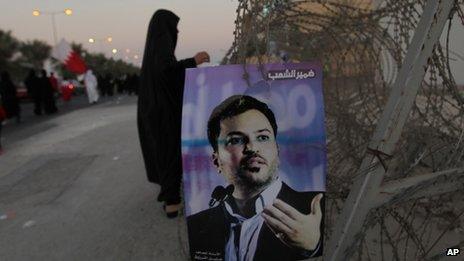Bahrain: National dialogue talks collapse
- Published

The main opposition bloc pulled out after the arrest of Shia figure Khalil Marzooq
Bahrain's government has officially suspended national reconciliation talks, which had already been boycotted by the main opposition group.
The Sunni-led government said it made the decision because of the refusal of groups from the country's Shia majority to attend the talks.
The talks were intended to resolve tensions after the government repression of mass protests in 2011.
Dozens were killed and many opposition supporters were jailed in the unrest.
Al-Wefaq, the main Shia opposition movement, pulled out of the talks last September after a prominent Shia figure, Khalil Marzooq, was arrested on charges of inciting terrorism.
The talks had achieved very little up to that point, with both sides blaming the other for the stalemate.
The national dialogue was structured in such a way that even agreeing an agenda between the various parties proved impossible in the year since the talks officially began, the BBC's Gulf analyst Bill Law says.
Still it will be a bitter blow to those in Bahrain who had put their hope in dialogue, says our correspondent.
Shia leaders say the government has not enacted the reform it promised to heal the scars and end the instability in the wake of the deadly crackdown on pro-democracy demonstrations.
Inspired by the popular uprisings in Tunisia and Egypt earlier in 2011, thousands took to the streets to demand fairer political representation.
The protesters were demanding more rights and an end to discrimination against the majority Shia community by the Sunni royal family.